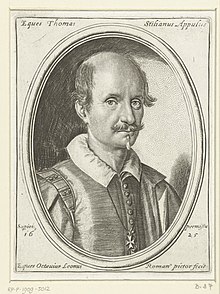fiction.wikisort.org - Writer
Tommaso Stigliani (1573–1651) was an Italian poet, literary critic, and writer.
Tommaso Stigliani | |
|---|---|
 Tommaso Stigliani | |
| Born | 1573 Matera, Kingdom of Naples |
| Died | 1651 Rome, Papal States |
| Occupation | Poet, literary critic, and writer |
| Language | Italian |
| Nationality | Napoletano |
| Period | Late Middle Ages |
| Literary movement | Baroque |
| Notable works | Il mondo nuovo (1617) Dello occhiale (1627) |
Biography
He was born in Matera, and educated in Naples where he met with the poets Torquato Tasso and Giambattista Marino. With the latter, Stigliani started a lifelong polemic and argument. Especially in Dello occhiale (Venice: Carempello, Sandro Bazacchi, 1627), Stigliani laments Marino's many “failures” in the poem Adone. Marino refused, Stigliani indignantly points out, to follow Aristotle's unities, ignoring the need for a proper beginning, middle, and an end. The poem is overwhelmed by superfluities, enthusiasms, and disproportion. In chapter 6, Stigliani regrets the way Marino “stumbles” through the episodes of Adonis and Venus. And so on, for more than 500 pages (there are tables at the end that list all of Marino's “errors”).[1]
Stigliani's contentious personality led him initially to seek employment in various courts of Northern Italy, including Parma, where he was employed by the Duke. But ultimately had to remove himself to Rome where he published a volume of his works, mainly romantic sonnets, in Canzoniero dato in luce da Balducci (1625, Rome). He had already published Il Mondo Nuovo (1617, Piacenza), an epic poem about the discovery of America. In his depiction, Stigliani merges a detailed description of America with characters and situations that are closer to the realities of life in Europe in the 1600s, creating a bridge between the two continents. Stigliani’s America is an allegory of the old world and the poet used it to construct a critique of the society of the day. The description of the newt that lives in the Rio de la Plata is a way to make fun of his competitor Giambattista Marino; the execution of the amazons in the poem is a criticism of the behavior of his patron Ranuccio Farnese; the mad people of the island of Brandana mirror the behavior of all the princes and courtiers who occupy every European Renaissance court. And since it is a poem, the shrewd poet can always defend himself by saying that the Mondo nuovo is, in part, a fictional work. According to Stigliani, the new world with all its faults such as cannibalism and the freedom of sexual mores is, despite everything, better than the corruption and flaws which he finds in his contemporary Europe.
Thanks to his friendship with Galileo supporter Virginio Cesarini, Stigliani was given the task of editing Galileo's Saggiatore (The Assayer) (1623).[2] Tommaso Stigliani died in Rome and his letters were published posthumously in 1661.[3]
Works
- Stigliani, Tommaso (1600). Il Polifemo. Milano. nella stampa del q. Pacifico Pontio impressore archiepiscopale. Retrieved 30 November 2019.
- Stigliani, Tommaso (1617). Il mondo nuovo (1 ed.). Piacenza. per Alessandro Bazacchi. Retrieved 30 November 2019.
- Stigliani, Tommaso (1628). Il mondo nuovo (2 ed.). Roma. Appresso Giacomo Mascardi. Retrieved 19 June 2019.
- Stigliani, Tommaso (1623). Il canzoniero del signor caualier fra' Tomaso Stigliani. Roma. per l'erede di Bartolomeo Zannetti. Retrieved 30 November 2019.
- Stigliani, Tommaso (1627). Dello occhiale opera difensiua del caualier fr. Tomaso Stigliani. Scritta in risposta al caualier Gio. Battista Marini. Dedicato all'eccellentiss. sig. conte D'Oliuares. Venezia. appresso Pietro Carampello. Retrieved 30 November 2019.
- Stigliani, Tommaso (1651). Lettere del caualiere fra Tomaso Stigliani dedicate al sig. prencipe di Gallicano. Roma. per Domenico Manelfi. Retrieved 30 November 2019.
Bibliography
- Menghini, Mario (1892). Tommaso Stigliani: contributo alla storia letteraria del secolo XVII. Genoa.
- Maragoni, Gian Piero (1989). "Stigliani «ne varietur». Appunti sulla riscrittura del «Polifemo»". Lettere Italiane. 41 (1): 90–98. JSTOR 26264542.
- Pieri, Marzio (1992). "«Les Indes Farnesiennes». Sul poema colombiano di Tommaso Stigliani". Annali d'Italianistica. 10: 180–189. JSTOR 24004484.
- Watt, Mary A. (2011). "Cosmopoiesis: Dante, Columbus and Spiritual Imperialism in Stigliani's "Mondo nuovo"". MLN. 127 (1): S245–S256. doi:10.1353/mln.2012.0042. JSTOR 41415866. S2CID 161219982.
- Valencia, María Dolores (2022). "Cultura y polemica literaria en el epistolario de Tommaso Stigliani". Encrucijadas en la Cultura Italiana. Dykinson, S.L.: 253–260. doi:10.2307/j.ctv2s0j64s.27. ISBN 9788411224048.
- Hester, Nathalie (2012). "Failed New World Epics in Baroque Italy". Poesis and Modernity in the Old and New Worlds. Vanderbilt University Press: 201–23. doi:10.2307/j.ctv16758g3.13. ISBN 9780826518347.
References
- Hyde Minor, Vernon (2006). The Death of the Baroque and the Rhetoric of Good Taste. Cambridge University Press. p. 171. ISBN 9780521843416.
- Hester 2012, p. 208.
- Dizionario biografico universale, Volume 5, by Felice Scifoni, Publisher Davide Passagli, Florence (1849); page 191.
External links
- Tommaso Stigliani entry (in Italian) by Luigi Fassò in the Enciclopedia italiana, 1936
На других языках
- [en] Tommaso Stigliani
[fr] Tommaso Stigliani
Tommaso Stigliani (né en 1573 à Matera et mort en 1651 à Rome) est un poète et écrivain italien.[ru] Стильяни, Томмазо
Томмазо Стильяни (итал. Tommaso Stigliani, 1573 (1573), Матера, Базиликата — 1651, Рим) — итальянский поэт и прозаик.Другой контент может иметь иную лицензию. Перед использованием материалов сайта WikiSort.org внимательно изучите правила лицензирования конкретных элементов наполнения сайта.
WikiSort.org - проект по пересортировке и дополнению контента Википедии